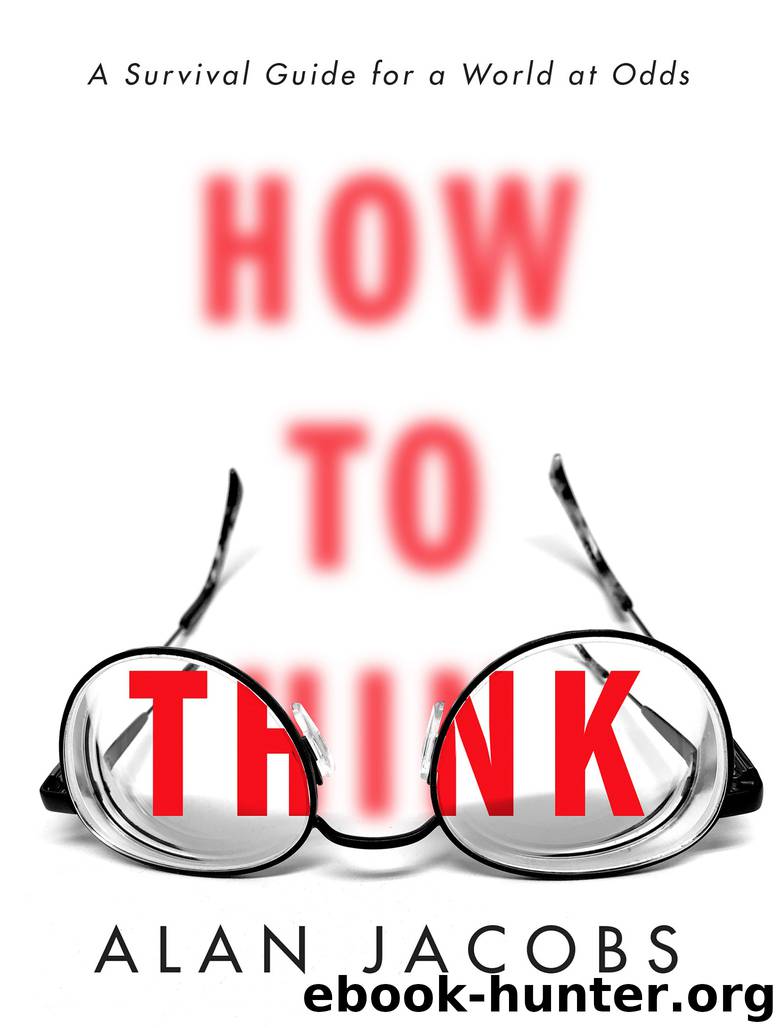How to Think by Alan Jacobs

Author:Alan Jacobs
Language: eng
Format: epub, pdf
Publisher: The Crown Publishing Group
Published: 2017-10-17T04:00:00+00:00
* * *
*1 http://slatestarcodex.com/2014/09/30/i-can-tolerate-anything-except-the-outgroup/
*2 “Post-Partisanship Is Hyper-Partisanship,” http://slatestarcodex.com/2016/07/27/post-partisanship-is-hyper-partisanship/. “We think of groups close to us in Near Mode, judging them on their merits as useful allies or dangerous enemies. We think of more distant groups in Far Mode—usually, we exoticize them. Sometimes it’s positive exoticization of the Noble Savage variety (understood so broadly that our treatment of Tibetans counts as an example of the trope). Other times it’s negative exoticization, treating them as cartoonish stereotypes of evil who are more funny or fascinating than repulsive. Take Genghis Khan—objectively he was one of the most evil people of all time, killing millions of victims, but since we think of him in Far Mode he becomes fascinating or even perversely admirable—‘wow, that was one impressively bloodthirsty warlord.’ ”
*3 The article appeared in the American Journal of Political Science 59, no. 3 (July 2015).
*4 It was Pius IX who made this statement in his famous Syllabus of Errors (Syllabus Errorum, 1864). Brownson—who was a fervent Catholic convert—made his statement in an essay titled “Reform and Reformers” (1863), which was part of the international conversation that led up to Pius’s Syllabus.
*5 Kass’s essay “The Wisdom of Repugnance” (New Republic, June 2, 1997) focused particularly on the repugnance he believed that we should feel at the prospect of cloning humans.
*6 C. S. Lewis, “ ‘Bulverism’ or, The Foundation of Twentieth Century Thought,” in God in the Dock: Essays on Theology and Ethics (Eerdmans, 1970), pp. 271–77.
*7 The phrase was coined by John Suler in “The Online Disinhibition Effect,” CyberPsychology & Behavior 7, no. 3 (2004): 321–26.
*8 Kierkegaard, Works of Love, trans. Howard and Edna Hong (Harper, 1964), p. 37.
*9 http://www.overcomingbias.com/
*10 https://www.washingtonpost.com/news/speaking-of-science/wp/2015/01/20/meet-the-woman-who-cant-feel-fear/. The woman’s story was originally told on the NPR podcast Invisibilia, with commentary from Antonio Damasio. In Descartes’ Error: Emotion, Reason, and the Human Brain (G. P. Putnam, 1994), Damasio develops his theory of “somatic markers”: our bodies in a very strong sense mark our minds in ways that encode and then trigger certain feelings; these markers are in turn essential to healthy thinking and good decision making. As Damasio strikingly states his conclusion, “The mind is embodied, in the full sense of the term, not just embrained.”
*11 Hans-Georg Gadamer, Truth and Method, 2nd ed., trans. revised by Joel Weinsheimer and Donald G. Marshall (Crossroad, 1992), p. 298.
*12 Kahneman and his longtime research partner Amos Tversky made a distinction between Humans and Econs, Econs being the purely rational—in the narrow sense of “rational” I have been arguing against—agents beloved of certain strains of economic theory. In Thinking, Fast and Slow, Kahneman, summarizing his work with Tversky, explains that Econs are creatures that are fairly easy to understand, but have the unfortunate trait of being purely imaginary. Humans, by contrast, are real but exceptionally complicated, and while they don’t behave as Econs do, they are not, says Kahneman, on that account to be dismissed as irrational. “The definition of rationality as coherence is impossibly restrictive; it demands adherence to rules of logic that a finite mind is not able to implement.
Download
This site does not store any files on its server. We only index and link to content provided by other sites. Please contact the content providers to delete copyright contents if any and email us, we'll remove relevant links or contents immediately.
Hit Refresh by Satya Nadella(9104)
The Compound Effect by Darren Hardy(8903)
Change Your Questions, Change Your Life by Marilee Adams(7717)
Nudge - Improving Decisions about Health, Wealth, and Happiness by Thaler Sunstein(7678)
The Black Swan by Nassim Nicholas Taleb(7086)
Deep Work by Cal Newport(7040)
Rich Dad Poor Dad by Robert T. Kiyosaki(6574)
Daring Greatly by Brene Brown(6486)
Principles: Life and Work by Ray Dalio(6375)
Playing to Win_ How Strategy Really Works by A.G. Lafley & Roger L. Martin(6177)
Man-made Catastrophes and Risk Information Concealment by Dmitry Chernov & Didier Sornette(5980)
Digital Minimalism by Cal Newport;(5739)
Big Magic: Creative Living Beyond Fear by Elizabeth Gilbert(5721)
The Myth of the Strong Leader by Archie Brown(5481)
The Slight Edge by Jeff Olson(5393)
Discipline Equals Freedom by Jocko Willink(5353)
The Motivation Myth by Jeff Haden(5190)
The Laws of Human Nature by Robert Greene(5133)
Stone's Rules by Roger Stone(5065)
